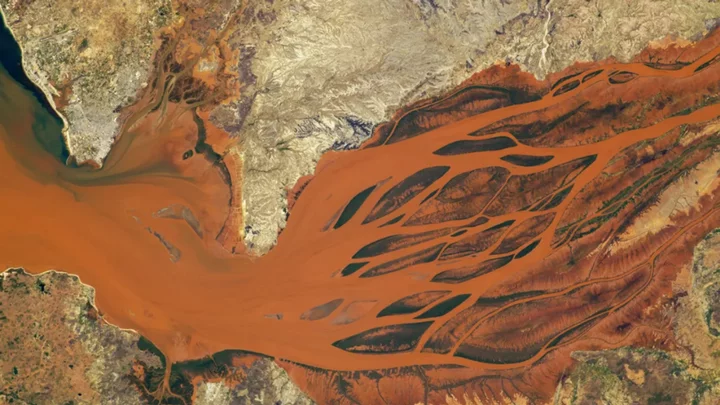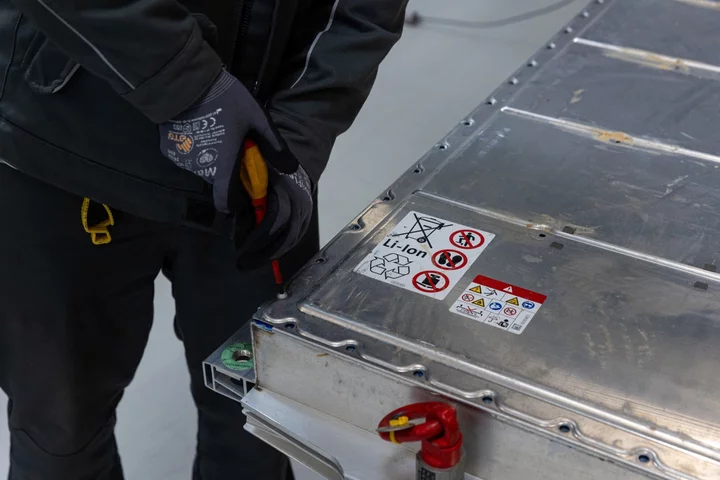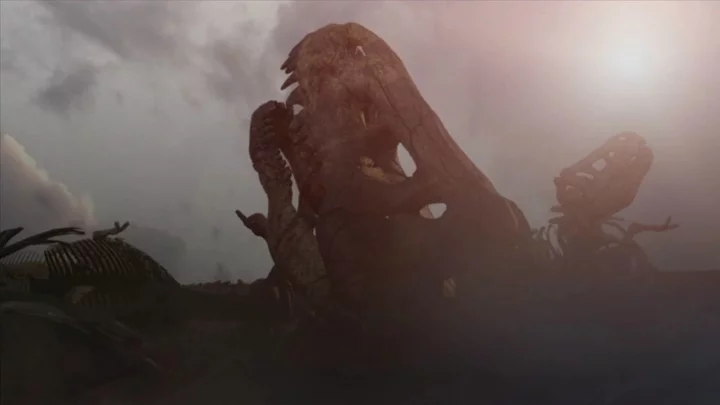
Astronauts capture the 'blood of Earth' in stunning photo
The Earth is home to truly stunning natural features, but sometimes you need a new perspective to appreciate it all over again. Thankfully, the experts at NASA are on hand to remind us just how incredible our planet is with the release of new photos showing the “blood of Earth”. The incredible images seem to show it bleeding, with dramatic red liquid appearing to cascade over the surface. However, it’s nothing at all to do with blood – which is probably just as well. Instead, the first picture shows the Laguna Colorada in the Bolivian Andes in South America from space. Remarkably, the image was taken by an astronaut onboard the International Space Station (ISS) using just a Nikon digital camera. The fact that it was taken more than 400 kilometres away from Earth on a handheld device is pretty staggering, and it offers a look at a natural phenomenon which we’d never otherwise get to see. The first picture shows the impact of red algae flourishing in the shallow water of the laguna, while the second shows the Betsiboka River Delta in Madagascar. This time, the red colour comes as a result of the iron-rich sediment. It’s pretty awe-inspiring stuff, and it’s not the first time that red “blood” has been seen running from our planet, either. Antarctica’s Blood Falls is a bizarre geographical feature in the McMurdo Dry Valleys region of the continent, and it’s one of the strangest natural phenomena you're likely to see. It features a flow of water the colour of blood that can be seen seeping out from a glacier into the ocean. The mystery behind it has fascinated members of the scientific community for decades, but a solution has now been found. Sign up for our free Indy100 weekly newsletter How to join the indy100's free WhatsApp channel Have your say in our news democracy. Click the upvote icon at the top of the page to help raise this article through the indy100 rankings
2023-11-07 20:25

Apple Shrunk the iPhone’s Carbon Footprint. There’s a Way to Shrink It Even Further
Apple has announced a dizzying array of products this year, though none more central to its business than
2023-11-07 20:21

WeWork Saga Cost Masayoshi Son $11.5 Billion and His Credibility
WeWork Inc.’s bankruptcy filing caps a years-long saga that revealed breathtaking flaws in the investment style of Japanese
2023-11-07 20:16

Dan Ashworth responds to Man Utd sporting director links
Newcastle United sporting director Dan Ashworth appears to have little intention of leaving the club amid high praise from Gary Neville and speculation that he could be poached by Manchester United to the same job.
2023-11-07 19:58

South Korea’s Ecopro Materials IPO Priced at Bottom of Range
Ecopro Materials Co., which supplies materials for electric vehicle batteries, cut the size of its initial public offering
2023-11-07 19:50

PayPal Rival Fintech Adyen Faces Investor Confidence Test
For years, Dutch payments fintech Adyen NV’s founders and management ran things their own way, thanks to some
2023-11-07 19:49

WeWork Goes Bankrupt, Signs Pact With Creditors to Cut Debt
WeWork Inc., once the biggest office tenant in Manhattan, has filed for bankruptcy listing nearly $19 billion of
2023-11-07 19:48

Priscilla Presley felt 'very concerned' about biopic
Priscilla Presley has revealed that she initially had some doubts about Sofia Coppola's new biopic.
2023-11-07 19:25

Marketmind: Some payback, but bonds hug gains on oil
A look at the day ahead in U.S. and global markets from Mike Dolan World markets are trying to calibrate
2023-11-07 19:24

Scientists think they’ve finally solved the mystery of how the dinosaurs went extinct
It’s one of the questions which has fascinated scientists for hundreds of years, but how did the dinosaurs really go extinct? Well, new research might have just solved the mystery once and for all. Of course, most people are familiar with the fact that an asteroid struck the Earth around 66 million years ago, but fewer people might know that the object measured a whopping 10 to 15 kilometres wide and landed in Mexico’s Yucatan Peninsula. Fewer people still might know that while it sparked all sorts of devastation, including earthquakes and megatsunamis, and now experts have revealed that what might have really proved fatal for the dinosaurs was the dust that it caused. We’re not talking a little bit of dust, either. Trillions of tons of the stuff was released into the atmosphere when then asteroid struck. The damage done by this dust is explored in the new report published by Nature Geoscience. So much was released, in fact, that it caused a “global winter”, with huge clouds of silicate dust and sulphur causing temperatures to drop by 15C. The lack of light would have caused entire ecosystems to collapse, causing 75 per cent of species to be rendered extinct. The effects of the dust could have blocked out sunlight for as long as two years, which according to the Belgium researchers who led the study is what would have killed off dinosaurs gradually – rather than being killed off straight away by the asteroid. It is, however, what eventually led to other life forms emerging and ultimately the development of the human race. "Dinos dominated Earth and were doing just fine when the meteorite hit," co-author of the study and planetary scientist Philippe Claeys said. "Without the impact, my guess is that mammals - including us - had little chance to become the dominant organisms on this planet." Sign up for our free Indy100 weekly newsletter How to join the indy100's free WhatsApp channel Have your say in our news democracy. Click the upvote icon at the top of the page to help raise this article through the indy100 rankings
2023-11-07 19:24

The Marvels 'takes inspiration from Iron Man 3'
Nia DaCosta has revealed some of the inspirations behind her new movie.
2023-11-07 19:19

UBS Shares Rise as Lender Wins Back Credit Suisse Clients
UBS Group AG reported stronger-than-expected client inflows in its wealth-management business, boosted by the first signs of stabilization
2023-11-07 18:58
